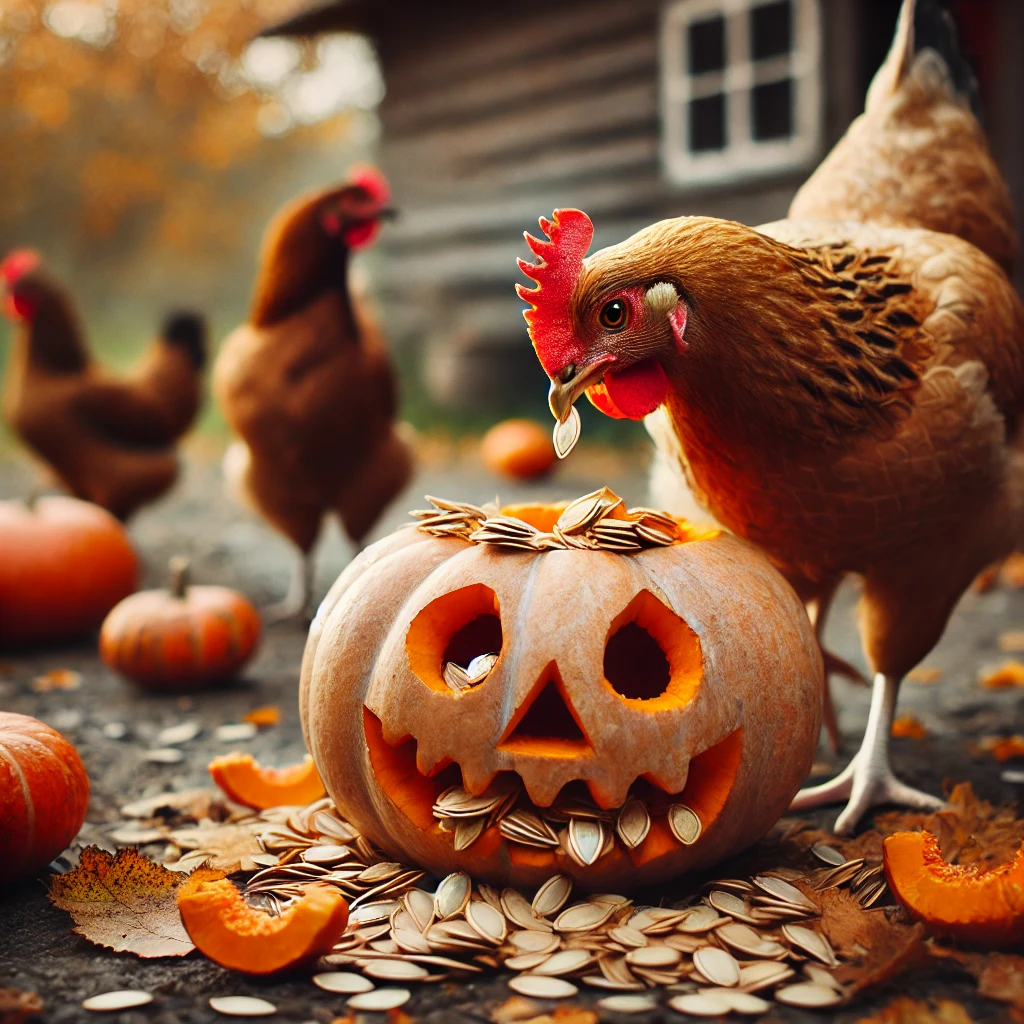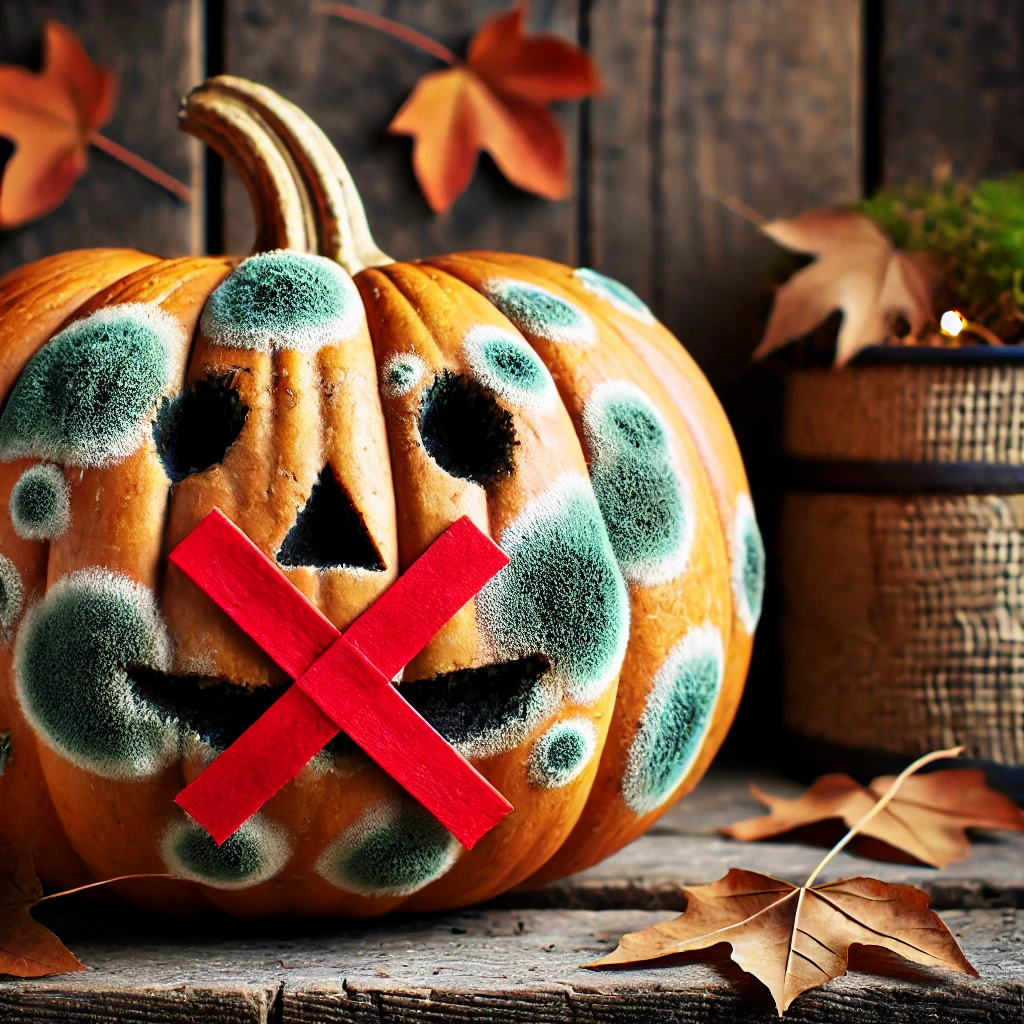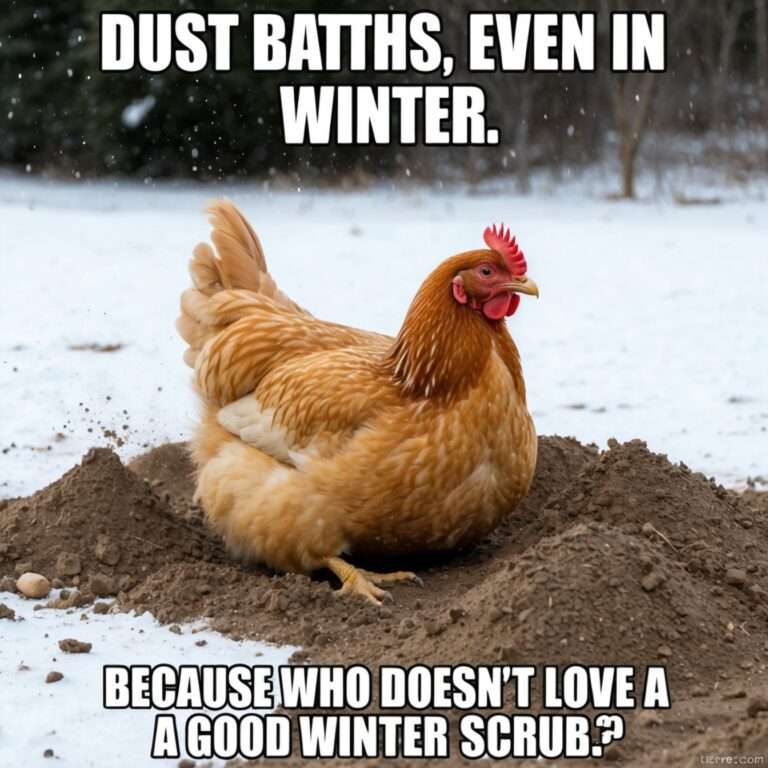
A backyard chicken enjoying a leftover Halloween pumpkin.
As Halloween ends and jack-o’-lanterns start to fade, many backyard chicken keepers wonder: Can chickens eat pumpkins? The answer is yes, but with a few important precautions. Pumpkins can be a nutritious, entertaining treat for your flock when prepared properly. This guide explores the benefits, risks, and best practices for feeding pumpkins to your chickens.
Are Pumpkins Safe for Chickens?
Pumpkins are generally safe for chickens, but there are some key considerations to keep in mind:
- Parts Chickens Can Eat: Chickens can consume the flesh, seeds, and skin of pumpkins.
- Avoid Moldy Pumpkins: Moldy or rotten pumpkins may contain harmful bacteria and toxins that could make chickens sick. Always inspect pumpkins for mold, especially leftover jack-o’-lanterns exposed to damp conditions.
Pro Tip: A pumpkin with some drying or shriveling is fine, but visible mold should be discarded to prevent health risks.

Health Benefits of Pumpkins for Chickens
Feeding pumpkins to chickens can provide several nutritional and behavioral benefits:
- Rich in Vitamins and Antioxidants:
- Vitamin A: Supports vision and healthy skin.
- Vitamin C and E: Boosts immunity and cellular health.
- Antioxidants: Help combat inflammation and promote overall well-being.
- Hydration and Digestive Health:
With high water content, pumpkins keep chickens hydrated during dry seasons. Their fiber supports digestive health and encourages regularity. - Natural Deworming Properties (Debated):
Pumpkin seeds contain cucurbitacin, a compound believed to paralyze parasites and aid their removal. While some chicken keepers swear by this, scientific evidence is limited. Seeds can be a helpful supplement but should not replace regular deworming practices. - Enrichment and Entertainment:
Pumpkins provide chickens with a stimulating activity. Peeling, pecking, and scratching at the pumpkin keeps chickens engaged, reducing boredom and associated behaviors like feather-pecking.
How to Feed Pumpkins Safely to Chickens
To ensure your flock benefits from pumpkins without risks, follow these steps:
- Use Fresh or Slightly Wilted Pumpkins:
Avoid pumpkins with visible mold or contamination. Rinse carved pumpkins to remove residues from paints or decorations. - Cut into Manageable Pieces:
Slice pumpkins into smaller sections to make them easier for chickens to peck at and consume. - Limit Portions:
While healthy, pumpkins should remain a treat and make up no more than 10% of your chickens’ diet. - Remove Seeds for Chicks:
Adult chickens can safely eat pumpkin seeds, but young chicks may choke. Remove seeds for younger birds or crush them into smaller pieces.
Are There Risks to Feeding Pumpkins to Chickens?
Although pumpkins are generally safe, there are a few risks to consider:
- Imbalanced Diet:
Overfeeding pumpkins may cause chickens to consume fewer nutrients from their balanced feed, leading to nutritional deficiencies. - Mold and Contamination:
Leftover pumpkins exposed to moisture can develop mold, which contains mycotoxins harmful to chickens. Moldy pumpkins can cause diarrhea, respiratory distress, or even fatal poisoning.
Pro Tip: Always monitor leftover pumpkins in the coop to prevent spoilage.
Fun Pumpkin Feeding Ideas for Chickens
- DIY Feeder: Carve a pumpkin, fill it with chicken feed, and let your flock peck away.
- Frozen Treats: Freeze small pieces of pumpkin for a refreshing snack during warmer weather.
- Forage Hunt: Scatter pumpkin seeds and chunks in the run to encourage natural foraging behaviors.
Conclusion: Can Chickens Eat Pumpkins?
Can chickens eat pumpkins? Absolutely—when served fresh, clean, and in moderation. Pumpkins are a seasonal treat that can boost hydration, provide valuable nutrients, and keep your flock entertained. However, it’s crucial to avoid moldy or overfed pumpkins to ensure your chickens remain healthy and happy.
This fall, as the jack-o’-lanterns fade, remember: what may seem like waste to us can be a feast for your flock. Pumpkins symbolize the cycles of nourishment in nature, offering benefits to both soil and chickens alike.
DARWIN’s Take
As the veil between worlds thins with Halloween’s end, we are left with the remnants—squash and shadows. Isn’t it curious that chickens thrive on what we discard? Pumpkins rot in our yards, symbols of seasonal indulgence, but to the chicken, they are a feast, a universe of taste and texture to unlock, peck by peck. In this exchange, perhaps the pumpkin offers a wordless reminder: that what seems waste to one creature is nourishment to another. And who’s to say it’s only the chickens who thrive on discarded remnants of autumn’s end? In the grand cycles, the roles we play may not be as distinct as we like to think.
Sources
Feeding pumpkins to chickens can be a nutritious and enjoyable treat for your flock. The following resources provide valuable insights into the benefits and considerations of incorporating pumpkins into your chickens’ diet:
- Feeding Chickens Pumpkins: Why, How, and When
This article discusses the nutritional advantages of pumpkins for chickens, highlighting their rich content of vitamins, minerals, and antioxidants. It also offers practical advice on how to safely prepare and serve pumpkins to your flock. - Can Chickens Eat Pumpkins? Feeding Tips & Benefits
This resource explores the various parts of the pumpkin that are safe for chickens to consume, including the flesh and seeds. It provides guidance on preparation methods and discusses the potential health benefits for your birds. - Can Chickens Eat Pumpkin Seeds for Worms?
This article examines the claim that pumpkin seeds act as a natural dewormer for chickens. It delves into the scientific evidence (or lack thereof) supporting this belief and offers recommendations for flock management. - Can Chickens Eat Pumpkin? A Concise, Full Feeding Guide
This guide provides comprehensive information on feeding pumpkins to chickens, including which parts are safe, how to prepare them, and the importance of moderation in their diet.
These resources offer a well-rounded understanding of the role pumpkins can play in your chickens’ nutrition and health.
Further Reading on Paranoid Prophet
- Paranoid Prophet – Benefits of Raising Backyard Chickens
This article delves into the many advantages of raising backyard chickens, including fresh eggs, natural pest control, and the joy of keeping these engaging animals as part of a sustainable lifestyle. - Paranoid Prophet – Chicken Dust Baths
This article explores the importance of dust baths for chicken health, including how they help prevent mites and lice, and offers practical advice on creating the perfect dust bath for your flock. - Paranoid Prophet – Winter Chicken Memes and Facts
A lighthearted but informative article combining fun memes with useful winter care tips for chickens, such as keeping their coop warm and maintaining a healthy diet during the colder months. - Paranoid Prophet – Wheatgrass and Hay for Winter Chickens
This resource highlights the nutritional benefits of wheatgrass and hay for chickens during winter. It explains how these additions can provide supplemental forage and improve overall flock health. - Paranoid Prophet – How Many Chickens to Start With?
A beginner’s guide for those considering starting a backyard flock. The article discusses the ideal number of chickens to raise based on space, resources, and personal goals.
FAQ: Can Chickens Eat Pumpkins?
Understanding Pumpkins in a Chicken’s Diet
1. Can chickens eat pumpkins?
Yes, chickens can eat pumpkins. Both the flesh and seeds are safe and nutritious treats for your flock, providing vitamins, fiber, and other essential nutrients.
2. Are pumpkin seeds safe for chickens?
Absolutely. Pumpkin seeds are safe and often enjoyed by chickens. They are believed to have natural deworming properties, though this claim is not scientifically proven.
3. What nutrients do pumpkins provide for chickens?
Pumpkins are rich in:
- Vitamins A and C: Boost immunity and support healthy feathers.
- Fiber: Aids digestion.
- Zinc and Magnesium: Enhance overall health and egg production.
Feeding Pumpkins Safely
4. How should I prepare pumpkins for chickens?
- Cut pumpkins into smaller pieces for easier pecking.
- Serve the seeds along with the flesh.
- Avoid moldy or chemically treated pumpkins.
5. Can I give my chickens leftover Halloween pumpkins?
Yes, as long as they are untreated and free of paint, wax, or chemicals. Ensure they are not moldy or rotten.
6. Are there risks to feeding chickens pumpkins?
The main risks are:
- Moldy pumpkins: These can be toxic to chickens.
- Overfeeding: Too much pumpkin can upset digestion or reduce their intake of essential feed.
Seasonal and Nutritional Benefits
7. Why are pumpkins a good seasonal treat for chickens?
Pumpkins are abundant in fall, making them a cost-effective and nutritious treat. They also provide enrichment, keeping chickens entertained and reducing boredom.
8. Do pumpkins help with deworming?
Pumpkin seeds contain cucurbitacin, believed to have deworming properties, but scientific evidence is inconclusive. They can complement, but not replace, regular parasite control measures.
9. Can pumpkins replace chicken feed?
No. Pumpkins should be treated as a supplement to a balanced poultry diet, not a substitute for formulated feed.
Fun and Creative Feeding Ideas
10. How can I use pumpkins for chicken enrichment?
- Hanging Feeder: Hang pumpkin halves in the coop for pecking.
- Frozen Treats: Freeze small pieces for warm days.
- Forage Hunt: Scatter seeds in the run to encourage natural foraging behavior.
11. How often can I feed pumpkins to my chickens?
Pumpkins should make up no more than 10% of their diet. A small portion once or twice a week is ideal.
12. Can chickens eat cooked pumpkins?
Yes, cooked pumpkins are safe, but they are best served raw to retain their full nutritional benefits.


